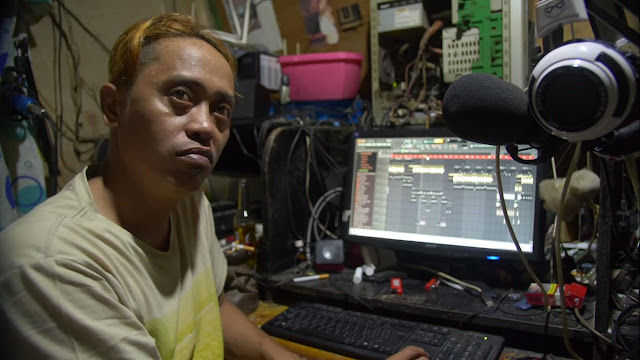Markado: Drowning in Meaning
Markado: Bakunawa sa Duha ka-Managlahing Takna (The Moon Devourer) is the debut feature of Joe Bacus, one of the leading filmmakers in Northern Mindanao. The film opens with the main protagonist, Sab (Jean Stefani Obsiana), walking through a labyrinthine alley of an urban poor community in Cagayan de Oro carrying a bag to a drug den at the end of this narrow winding road. An exchange is made and on her way back, she encounters a team of policemen who are about to raid the house. This opening scene, shot using a long take, introduces us not only to the drug trade that is at the center of the film but to a dizzying portrait of a city that grapples with the aftermath of typhoon Sendong.
Sab has more than one reason to engage in the dangerous drug trade which has captured the world's attention because of the bloody crackdown on drug dealers and users in the Duterte administration's Tokhang campaign resulting in the death of more than 20,000 people. Sab is trying to save her ailing grandmother in the hospital whose mounting bills has forced her into the drug trade as a small-time courier. When selling her personal stuff would not suffice, Sab's desperation grows and does not remit the drug money to her handlers. She becomes a target of a manhunt by members of the drug syndicate.
Life becomes more complicated for Sab when in the course of evading the drug syndicate she mysteriously falls ill. As her health condition deteriorates, she used the drug money to seek medical help from an international medical mission of questionable background.
Now in hiding Sab must also try to make sense of her grandmother's last wish to continue their bloodline. Due to her health condition, she is unable to bear a child. This, however, does not stop her in fulfilling her grandmother's wish and is determined to bear a child even if it puts her life in danger.
There is nothing much that we know about Sab’s family. It is presumed that her parents died during the typhoon Sendong. During a conversation between Sab and her bestfriend Mandy (Roxan Lood) in the baywalk, Sab recalls the disturbing state of her grandmother after the typhoon hit their city. She tells Mandy that her grandmother was found in the Macajalar Bay area. This is also the reason why her grandmother was hospitalized because the doctors found foreign objects in her lungs, which she got from the floodwater.
This lack of information on the nature of Sab's character prevents us from fully sympathizing with her. There is not enough handle to engage us in her predicament and its eventual resolution.
The effect of Sendong, one of the deadliest typhoons that hit Mindanao in recent memory, does not provide the characters the motivation for their choices and actions. It is a backdrop that the film fails to utilize turning out to be contrived piece of information. Tropical storm Sendong (international name, Washi) made a landfall on December 15, 2011 in the northern part of Mindanao. Although there were early warning forecasts, the water raging from the mountains was overlooked. Flashfloods and landslides sent mud and logs crashing down on communities that traverse and near Cagayan de Oro, Iponan and Mandulog rivers, as well communities near the mountains and sea. Most casualties were from the cities of Cagayan de Oro and Iligan.
Markado's visual treatment utilized live action and stop-motion animation to tell the story. This duality provides a jarring quality to the film portraying a city that attempts to grapple with its identity, caught between the crossroads of a tumultuous past and the challenges of a cosmopolitan future. However, the animation falls flat in bringing the horror to the fore desensitizing the gory scenes and diminishing the nauseating feeling of violence. By using this treatment, Bacus reinforces the already nonchalant and desensitized Filipino reaction to the drug war as an ordinary everyday reality.
Incorporating folklore into the film, Bacus uses the mythical creature called aswang as an inhabitant of the city. This concept is reminiscent of Prime Cruz’s Ang Manananggal sa Unit 23B (The Manananggal at Unit 23B), which makes the supernatural more relatable because of the exploration of mundane concerns. However, Bacus fails to give us a compelling story that would transcend our notion of this creature and make it as a metaphor for the intrinsic changes that also takes place in the city. Markado could have been a profound meditation on Sendong and its psychosocial effects to its survivors. But like debris in a gushing floodwater, the film is drowned in the contrivance of its narrative construction to make its point.
Sab has more than one reason to engage in the dangerous drug trade which has captured the world's attention because of the bloody crackdown on drug dealers and users in the Duterte administration's Tokhang campaign resulting in the death of more than 20,000 people. Sab is trying to save her ailing grandmother in the hospital whose mounting bills has forced her into the drug trade as a small-time courier. When selling her personal stuff would not suffice, Sab's desperation grows and does not remit the drug money to her handlers. She becomes a target of a manhunt by members of the drug syndicate.
Life becomes more complicated for Sab when in the course of evading the drug syndicate she mysteriously falls ill. As her health condition deteriorates, she used the drug money to seek medical help from an international medical mission of questionable background.
Now in hiding Sab must also try to make sense of her grandmother's last wish to continue their bloodline. Due to her health condition, she is unable to bear a child. This, however, does not stop her in fulfilling her grandmother's wish and is determined to bear a child even if it puts her life in danger.
There is nothing much that we know about Sab’s family. It is presumed that her parents died during the typhoon Sendong. During a conversation between Sab and her bestfriend Mandy (Roxan Lood) in the baywalk, Sab recalls the disturbing state of her grandmother after the typhoon hit their city. She tells Mandy that her grandmother was found in the Macajalar Bay area. This is also the reason why her grandmother was hospitalized because the doctors found foreign objects in her lungs, which she got from the floodwater.
This lack of information on the nature of Sab's character prevents us from fully sympathizing with her. There is not enough handle to engage us in her predicament and its eventual resolution.
The effect of Sendong, one of the deadliest typhoons that hit Mindanao in recent memory, does not provide the characters the motivation for their choices and actions. It is a backdrop that the film fails to utilize turning out to be contrived piece of information. Tropical storm Sendong (international name, Washi) made a landfall on December 15, 2011 in the northern part of Mindanao. Although there were early warning forecasts, the water raging from the mountains was overlooked. Flashfloods and landslides sent mud and logs crashing down on communities that traverse and near Cagayan de Oro, Iponan and Mandulog rivers, as well communities near the mountains and sea. Most casualties were from the cities of Cagayan de Oro and Iligan.
Markado's visual treatment utilized live action and stop-motion animation to tell the story. This duality provides a jarring quality to the film portraying a city that attempts to grapple with its identity, caught between the crossroads of a tumultuous past and the challenges of a cosmopolitan future. However, the animation falls flat in bringing the horror to the fore desensitizing the gory scenes and diminishing the nauseating feeling of violence. By using this treatment, Bacus reinforces the already nonchalant and desensitized Filipino reaction to the drug war as an ordinary everyday reality.
Incorporating folklore into the film, Bacus uses the mythical creature called aswang as an inhabitant of the city. This concept is reminiscent of Prime Cruz’s Ang Manananggal sa Unit 23B (The Manananggal at Unit 23B), which makes the supernatural more relatable because of the exploration of mundane concerns. However, Bacus fails to give us a compelling story that would transcend our notion of this creature and make it as a metaphor for the intrinsic changes that also takes place in the city. Markado could have been a profound meditation on Sendong and its psychosocial effects to its survivors. But like debris in a gushing floodwater, the film is drowned in the contrivance of its narrative construction to make its point.
~ This film review was part of the Film Criticism Workshop of the Ngilngig Asian Fantastic Film Festival 2019.



Comments
Post a Comment
You are welcome to share your ideas with us in comments!